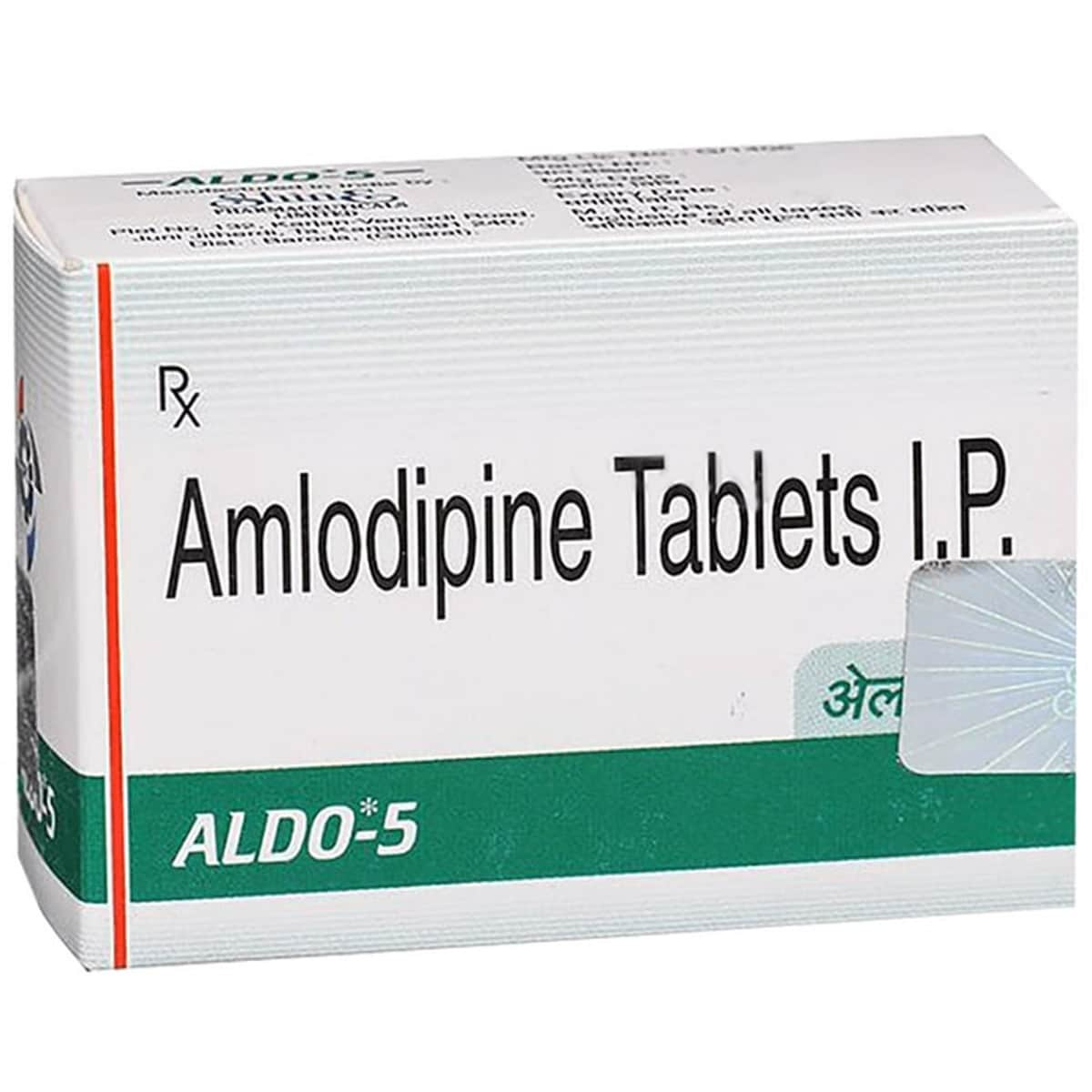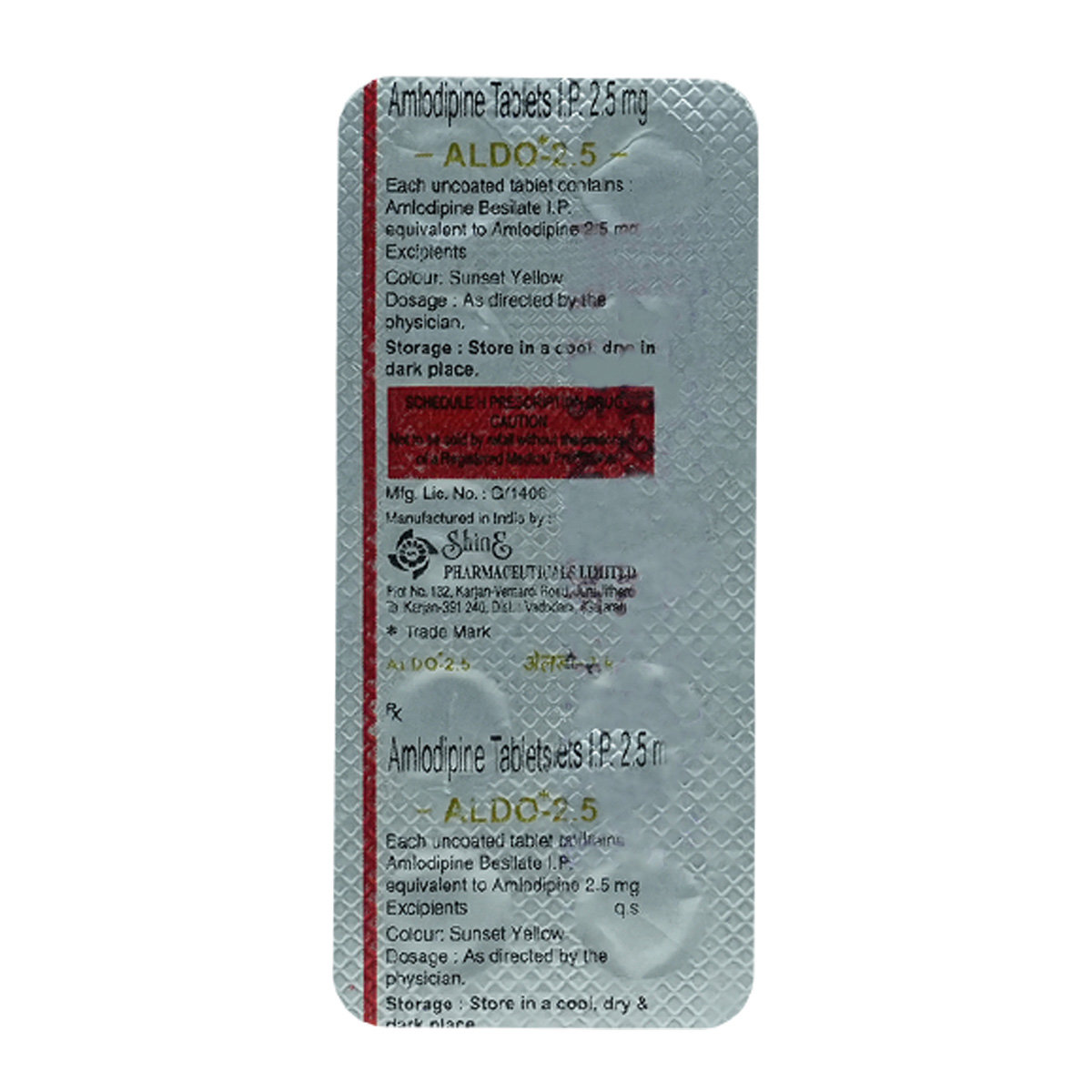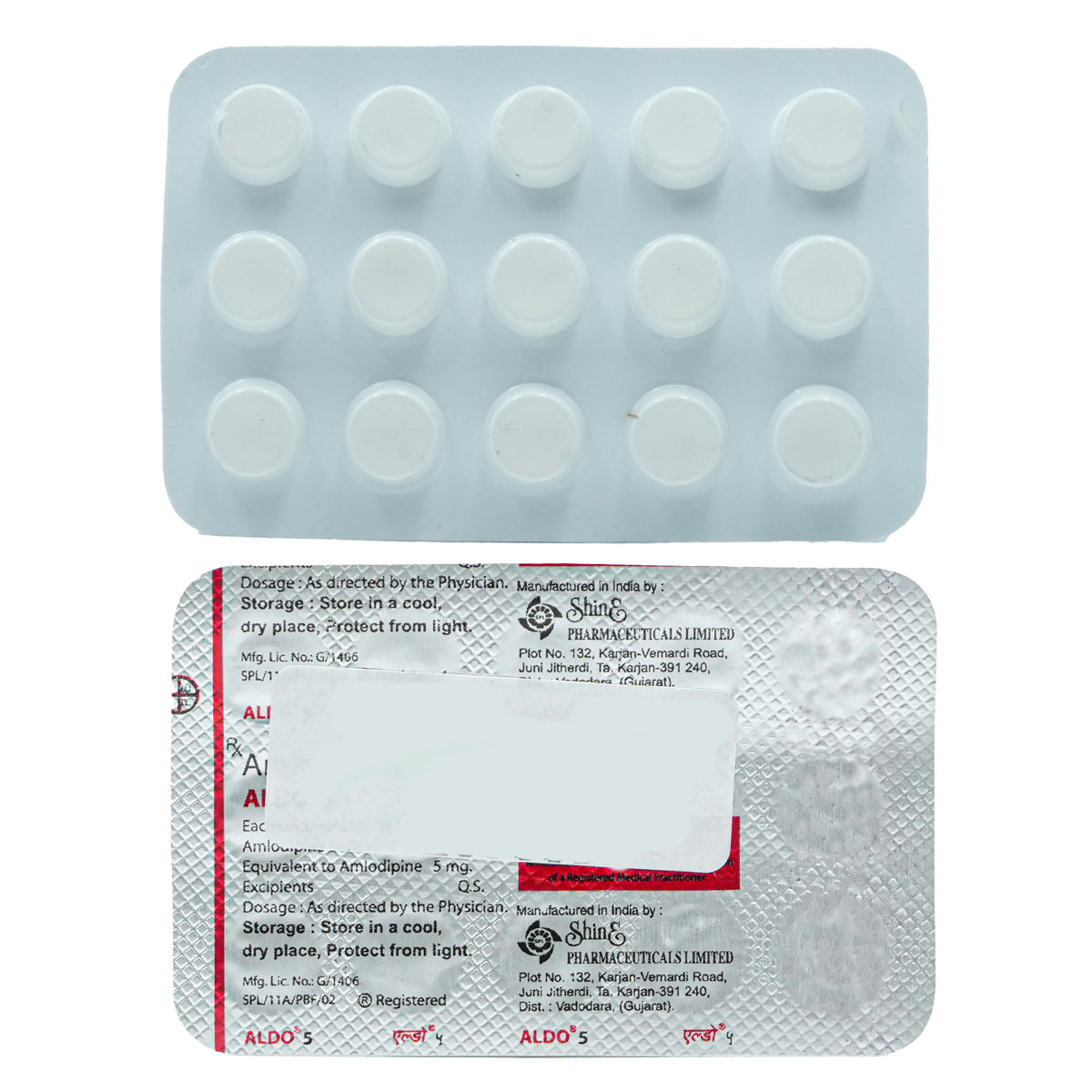Amlodipine
About Amlodipine
Amlodipine belongs to a class of medicines called calcium channel blockers which are primarily taken for the treatment of hypertension (high blood pressure) and angina (chest pain). Hypertension (high blood pressure) is a lifelong or chronic condition in which the force exerted by the blood against the artery walls becomes high. Higher this blood pressure, harder the heart has to pump.
Amlodipine contains Amlodipine, a calcium channel blocker that acts by relaxing the blood vessels. This reduces the workload on the heart and makes the heart more efficient at pumping blood throughout the body. Thus, it helps to lower high blood pressure, reducing the chances of heart attack or stroke.
Take Amlodipine with or without food as prescribed by your doctor with a full glass of water. Amlodipine may be prescribed alone or in combination with other blood pressure lowering medicines depending upon your blood pressure levels. Inform your doctor if you are taking any other anti-hypertensive medicine. You may have common side effects like headache, feeling exhausted and swollen ankles that usually resolve after some time. You must closely monitor your blood pressure if you ever have had a stroke, heart attack or currently taking other blood pressure-lowering pills. It is advised to continue taking this drug and do not stop taking it suddenly without consulting your doctor.
It is advisable to drink plenty of fluids while taking this medicine. Lifestyle changes are particularly helpful in achieving optimum outcomes with Amlodipine and keeping blood pressure under check. Low salt diet, daily physical activity (even 20-30 minute brisk walking for 5 days a week can help!), losing weight in case of people who are obese etc are the mainstay of treatment of hypertension. Inform your doctor if you have had an allergic reaction to Amlodipine, are pregnant or are planning to get pregnant, are breastfeeding, have liver disease, kidney disease, heart failure, heart valve problem or history of heart attack.
Uses of Amlodipine
Medicinal Benefits
Amlodipine is used to treat heart-related conditions like angina (chest pain) and high blood pressure (hypertension). It is a calcium channel blocker that inhibits the entry of calcium (ions) across the heart that relaxes and widens the smooth muscles for better blood flow. Besides this, Amlodipine help prevent sudden spasm of the coronary artery (blood vessels of the heart) and reduces how hard the heart has to work to pump blood around the body, lowering its oxygen requirements. It improves an individual’s tolerance to physical activity and exercise and keeps their blood pressure normal during exercise. As a result, it overall protects your heart and keeps your heart healthy.
Directions for Use
Storage
Side Effects of Amlodipine
- Dizziness
- Lightheadedness
- Headache
- Feeling exhausted
- Swollen ankles
- Nausea
Drug Warnings
Amlodipine should not be given to the people allergic to Amlodipine, have low blood pressure (less than 90 mm of Hg), have had heart attack, kidney disease, liver disease, pregnant women or planning to get pregnant and breastfeeding women without the prescription of a doctor. Besides this, it is contraindicated in patients with aortic stenosis (heart valve problem). Amlodipine can pass into breast milk, but its effect on the baby is not known. So, it is better to tell your doctor if you are taking Amlodipine and breastfeeding.
Drug Interactions
Drug-Drug Interaction: Amlodipine may interact with high blood pressure lowering pills (benazepril, metoprolol, ramipril, hydrochlorothiazide etc), drugs used to control lipid levels in the blood (atorvastatin, simvastatin etc), medicines to treat erectile dysfunction (sildenafil), antibiotics (clarithromycin, erythromycin, rifampin), antifungal (itraconazole, ketoconazole), anti-HIV drugs (ritonavir), anti-epilepsy medicines (carbamazepine, phenytoin, phenobarbital, primidone), immune-suppressing drugs (cyclosporine, tacrolimus) and painkillers (ibuprofen, aspirin).
Drug-Food Interaction: Avoid foods with high fat or cholesterol. Avoid too much salt in your diet like pickles, extra salt on salad etc.
Drug-Disease Interaction: Amlodipine should not be given to the people with cardiogenic shock (when the heart fails to pump required blood to the body), heart valve problem (stenosis), low blood pressure (hypotension), liver disease or heart failure.
Drug-Drug Interactions Checker List:
Safety Advice

Alcohol
unsafeYou are recommended not to consume alcohol along with Amlodipine to avoid unpleasant side effects like lowering of blood pressure (hypotension).

Pregnancy
cautionAmlodipine belongs to FDA Category C in pregnancy. There is limited evidence regarding use of Amlodipine and is generally not preferred as the initial treatment of hypertension in pregnancy. It is best to consult your doctor if you have high blood pressures during pregnancy.

Breast Feeding
cautionLimited information has shown that levels of amlodipine in milk are usually low and levels of Amlodipine in blood of breastfed infants are undetectable. Use of Amlodipine during breastfeeding has not been shown to cause any harmful effects in breastfed babies. If Amlodipine is required by the mother, it is not a reason to discontinue breastfeeding. If you are a nursing mother, it is best to consult your Obstetrician regarding use of Amlodipine.

Driving
unsafeDrive with caution, Amlodipine usually causes drowsiness and affects driving ability.

Liver
cautionAmlodipine to be taken with caution, especially if you have or have had a history of liver disease. Your doctor will have to change the dosage depending on your medical condition and your reaction to treatment.

Kidney
cautionAmlodipine is generally safe to prescribe in patients with kidney diseases and dose adjustment is generally not required. However, your doctor will decide the appropriate dosage strength depending upon the severity of your condition.

Children
cautionAmlodipine can be given safely to children aged 6-12 years provided, dose has been prescribed by a child specialist. Amlodipine should not be given to the children without consulting a child specialist.
Habit Forming
Diet & Lifestyle Advise
- Keep your weight under control with BMI 19.5-24.9.
- Do regular physical activity or exercise for at least 150 minutes per week, or about 30 minutes most days of the week. Doing this can help you to lower your raised blood pressure by about 5 mm of Hg.
- Opt for diet rich in whole grains, fruits, veggies and low-fat dairy products.
- Limit intake of sodium chloride (table salt) in your daily diet to 2300 mg per day or less than 1500 mg is ideal for most adults.
- If you are taking alcohol then only one serving for women and two servings for men is advisable.
- Quitting smoking is the best strategy to lower the risk of heart disease.
- Avoid chronic stress as it can raise your blood pressure. Try to enjoy and spent time with your loved ones to cope with stress and practice mindfulness techniques.
- Monitor your blood pressure daily and if there is too much of fluctuation then immediately contact your doctor.
- Try to include heart healthy omega 3 fatty acid containing food drinks in your daily diet. You can also use low fat cooking oil like olive oil, soybean oil, canola oil and coconut oil can help in lowering your elevated blood pressure.
Special Advise
- Amlodipine is generally advised for treatment of high blood pressure and other heart conditions.
- Amlodipine should be taken at the same time every day for its maximum effects to be seen and for increased compliance.
- Consumption of Amlodipine may cause dizziness. Avoid activities like driving while on this medication.
- Sudden drop of blood pressure may be seen while on this medication which might lead to dizziness. Changing your posture at a slower rate might help counter this.
- Ankle swelling is a sometimes seen as a side effect with this drug. Consult your doctor if this or other side effects cause trouble or are persistent.
Patients Concern
Disease/Condition Glossary
Blood pressure: It is the measurement of the force that our heart uses to pump blood to all parts of the body. Hypertension is a chronic condition when blood pressure is too high. This condition can lead to hardened arteries (blood vessels), decreasing the blood and oxygen flow to the heart. Raised blood pressure can cause chest pain (angina) and heart attack (when blood supply to the heart is blocked). Additionally, high blood pressure also causes brain damage (stroke) and kidney failure. High blood pressure can be diagnosed with the help of a blood pressure monitor. Systolic pressure is the pressure with which the heart pumps blood out. On the other hand, diastolic pressure is the pressure when your heart is at the resting stage between heartbeats. If your blood pressure is 140/90 mm of Hg, it means the systolic pressure is 140 mm of Hg and, diastolic pressure is 90 mm of Hg. Ideal blood pressure should be between 90/60 mm of Hg and 120/80 mm of Hg.
FAQs
No, you are advised to inform your doctor and monitor your blood pressure for at least two weeks before stopping the medicine. Depending upon your current blood pressure readings, there is a possibility your doctor may lower your medicine dosage and not recommend discontinuing it.
In case, you have missed a dose of Amlodipine, you are advised to take it as soon as you remember. However, try not to miss a dose in the first place, if it's time for you to take your next dose, then do not take both the doses together. Take only one dose, taking a double dose of Amlodipine will lead to low blood pressure.
Amlodipine can be safely taken as long as your doctor has prescribed it to you. Conditions such as high blood pressure are life-long conditions and one should not abruptly discontinue it without discussing it with a doctor.
Yes, Amlodipine may cause dizziness. It is advised to avoid driving or operate any heavy machinery while taking Amlodipine. In case you feel dizzy or light-headed, it is advised to rest for some time until you feel better.
Yes, Amlodipine is contraindicated in people with known allergy to any of the components of this medicine. It should be used with caution in people with liver impairment. It should also be avoided in women who are in the second and third trimesters of their pregnancy.
It's unlikely that Amlodipine affects fertility in men or women. However, there's not enough evidence to say for certain. For best advise, consult your doctor.
Yes, Amlodipine is known to cause ankle swelling upon long term use. Please try to keep your feet up when sitting for long hours. If the problem persists still, consult your doctor and do as advised.
High blood pressure during pregnancy is called 'Pregnancy induced hypertension' (PIH). It is harmful for both the baby and the mother. In the mother, very high blood pressure can cause seizures (fits), headache, swelling of feet, kidney damage and a higher risk of bleeding during pregnancy and during delivery. This can also affect the baby by causes abnormal fetal heart rate of the baby, risk of still birth and small baby. So, during the pregnancy you should have regular blood pressure monitoring. Visit your Obstetrician if you have any concerns related to blood pressure during pregnancy.







